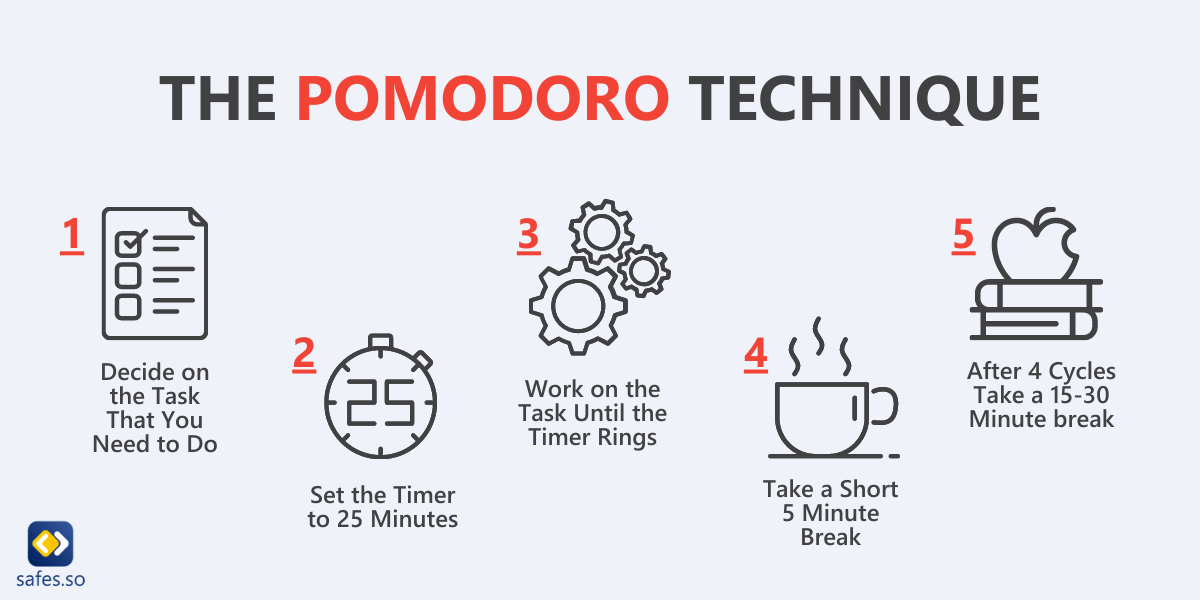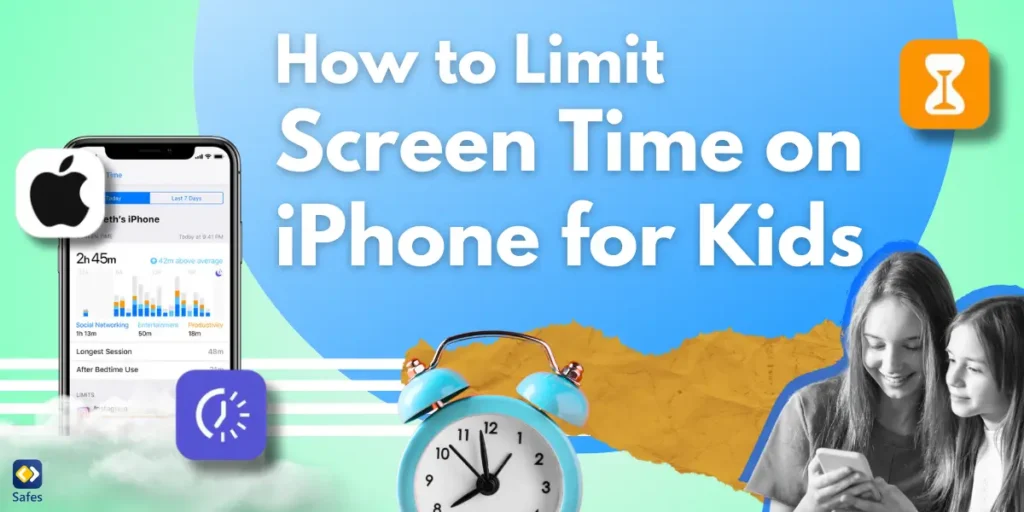Time management is a crucial skill for success in all areas of life, and it is especially important for teenagers who are balancing schoolwork, social activities, and other responsibilities. Many teens struggle with managing their time effectively, which can lead to stress, poor grades, and missed opportunities. As a parent, you can play a significant role in helping your teen develop strong time management skills. In this blog post, we will discuss the importance of time management for teens and provide tips and strategies for parents to support their teens in managing their time effectively.
Download and Start Your Free Trial of the Safes Parental Control App
Identifying Time Management Challenges
Time management is a crucial skill for teenagers to develop, but it can be challenging. Procrastination, lack of motivation, and difficulty prioritizing tasks are some of the most common time management challenges faced by teens. To identify these challenges in teens, parents can look out for signs such as missed deadlines, unfinished tasks, and poor grades.
To teach time management, parents can start by setting clear expectations and creating a routine. Encourage your teen to use a planner or calendar to keep track of tasks and deadlines. Break down large projects into smaller, manageable tasks and help your teen prioritize them. Teach your teen to avoid distractions such as social media and gaming during study time. Finally, celebrate successes and provide positive feedback to encourage good time management habits.
Strategies for Helping Teens Manage Their Time
Effective time management is an essential skill for teenagers to develop, and there are several practical strategies that parents can use to help their teens manage their time effectively. Setting goals, creating a schedule, and teaching prioritization skills are some of the most effective time management exercises that parents can use to help their teens.
To help teens break down large tasks, parents can encourage them to use the Pomodoro technique, which involves breaking tasks into 25-minute intervals with short breaks in between. Parents can also help their teens avoid procrastination by encouraging them to start with the most challenging tasks first or by setting deadlines for tasks.

Creating a schedule can also be a useful time management exercise for teens. Parents can work with their teens to create a weekly schedule that includes time for schoolwork, extracurricular activities, and socializing. This can help teens stay on track and avoid feeling overwhelmed.
Teaching prioritization skills is another effective time management exercise for teens. Parents can help their teens prioritize tasks by encouraging them to focus on the most important tasks first, delegating tasks when possible, and avoiding multitasking. By using these strategies, parents can help their teens develop strong time management skills that will serve them well throughout their lives.
Tools for Managing Time
In addition to practical strategies, there are several time management tools that can be useful for teens. These tools can help teens stay organized, track their time, and stay focused on tasks.
Productivity apps are one of the tools that can be particularly useful for teens. These apps can help teens stay on top of their to-do lists, set reminders, and track progress on projects. Examples of productivity apps include Trello, Asana, and Todoist.
Time-tracking software is another useful tool for teens. This type of software can help teens understand how they are spending their time and identify areas where they may be wasting time. Examples of time-tracking software include RescueTime, Time Doctor, and Toggl.
Timers can also be an effective time management tool for teens. Timers can help teens stay focused on tasks and avoid distractions. For example, a teen could set a timer for 25 minutes and work on a task without interruption until the timer goes off. Examples of timers include the Pomodoro timer and the Focus@Will app.
How Does Safes Help with Teens’ Time Management?
The Safes parental control app is an excellent tool for parents to help their teens manage their time effectively. The app includes several features that enable parents to set limits on their teen’s device usage and encourage healthy habits.
One of the key features of the app is the screen time limit, which allows parents to set a specific amount of time that their teens can use leisure apps and games each day. This feature helps teens balance their time between leisure activities and more productive tasks.
The instant block and bedtime mode features are also helpful for parents who want to encourage healthy routines and prevent their teens from wasting time on their devices. With these features, parents can set specific times when the device is unavailable, helping their teens establish healthy habits and prioritize their time.
The app blocker feature is another useful tool for parents who want to help their teens stay focused while studying. This feature allows parents to block distractions from unnecessary apps, such as social media or gaming apps, while their teens are studying or working on important tasks.
By using the Safes parental control app, parents can help their teens develop good time management habits and establish healthy routines that will serve them well in the future.
Safes is now available for both Android and iOS devices. Download it today and benefit from a 14-day free trial with premium features. To learn how to install and use Safes, use the resources below:
- Windows parental controls
- Macbook parental controls
- Parental controls on Android
- iPhone parental controls
Balancing Academic and Extracurricular Activities
Balancing academic and extracurricular activities is essential for teenagers. While academic success is essential, extracurricular activities can help teens develop important skills and interests. However, without proper time management, attempting to balance both can lead to stress, burnout, and poor performance in both areas.
To help teens achieve a healthy balance, parents can encourage their teens to prioritize their time and be realistic about their commitments. Parents can help their teens create a schedule that includes time for schoolwork, extracurricular activities, and socializing.
When it comes to schoolwork, parents can encourage their teens to break down larger projects into smaller, more manageable tasks. They can also help their teens prioritize their work by focusing on the most important tasks first.
- Related Article: 11 Things You Can Do Now When Your Child Can’t Study
For sports and clubs, parents can work with their teens to understand the time commitment involved and ensure that they have enough time for schoolwork and other activities. It’s also important for parents to encourage their teens to communicate with their coaches or club leaders if they feel overwhelmed or need to adjust their schedule.
Finally, parents can help their teens make the most of their free time by encouraging them to pursue hobbies and interests that they enjoy. By helping their teens achieve a healthy balance, parents can support their teens in achieving their goals and reducing stress in their lives.

Communication and Support
Effective communication and emotional support are key components of helping teens manage their time effectively. Parents should maintain open communication with their teens and provide a supportive environment where they can discuss their challenges and successes.
When communicating with their teens about time management, parents should be patient and understanding. They should avoid blaming or criticizing their teens for poor time management and instead focus on finding solutions together. Parents can also encourage their teens to take breaks when needed and practice self-care to manage stress.
Providing emotional support is also crucial for helping teens manage their time effectively. Parents should listen to their teens without judgment and offer guidance when needed. They should also celebrate their teens’ successes and provide positive reinforcement to encourage good time management habits.
By using effective communication and providing emotional support, parents can help their teens develop strong time management skills and achieve their goals.
Conclusion
In conclusion, teaching time management to teens can be a challenging but rewarding experience for parents. By understanding the common challenges that teens face, identifying their strengths and weaknesses, and using practical strategies and tools, parents can help their teens develop strong time management skills that will serve them well throughout their lives. It is important for parents to communicate openly with their teens, offer emotional support, and celebrate successes to encourage good time management habits. With these tips and strategies, parents can help their teens achieve a healthy balance between academic and extracurricular activities, reduce stress, and achieve their goals. By working together, parents and teens can establish a foundation for success and well-being both now and in the future.
Your Child’s Online Safety Starts Here
Every parent today needs a solution to manage screen time and keep their child safe online.
Without the right tools, digital risks and excessive screen time can impact children's well-being. Safes helps parents set healthy boundaries, monitor activity, and protect kids from online dangers—all with an easy-to-use app.
Take control of your child’s digital world. Learn more about Safes or download the app to start your free trial today!




